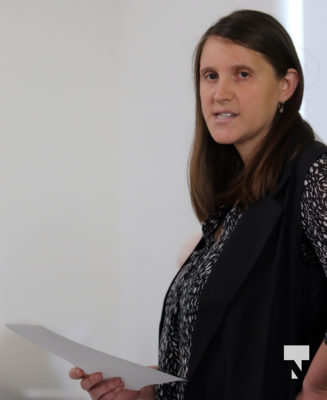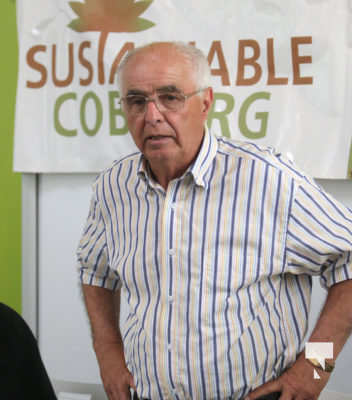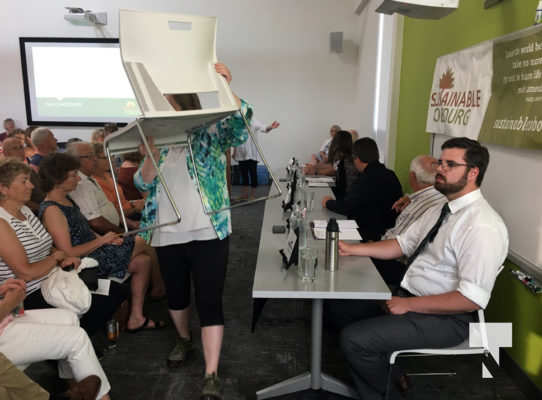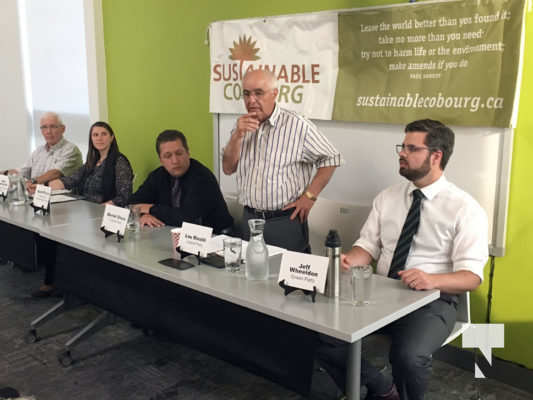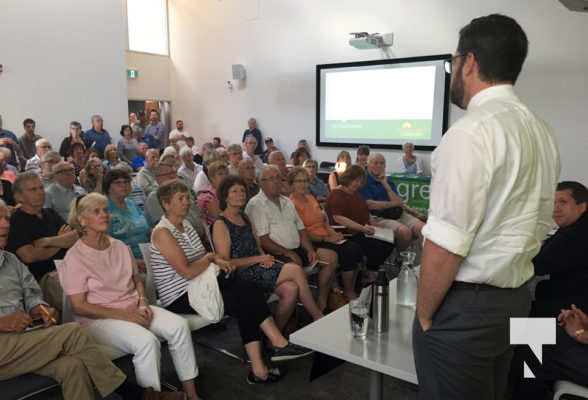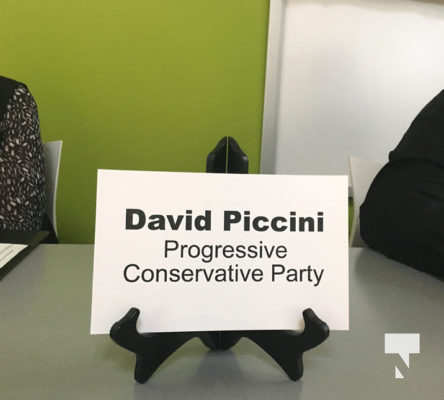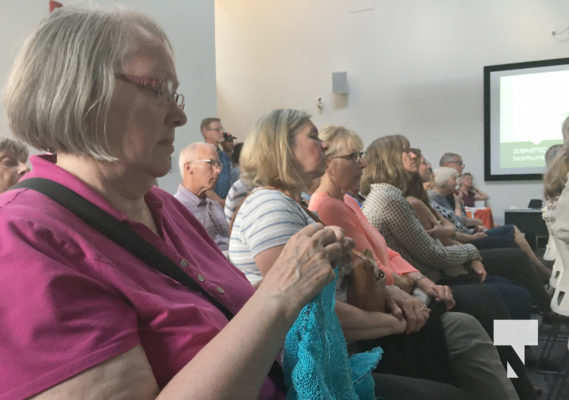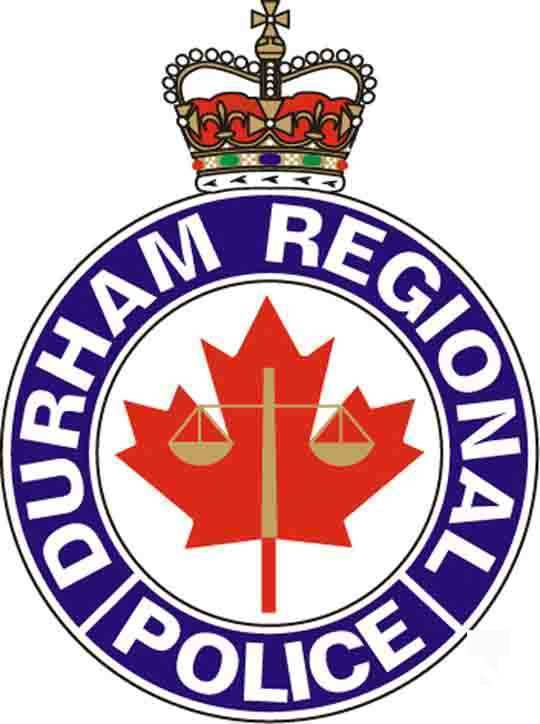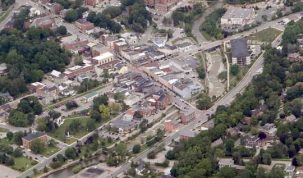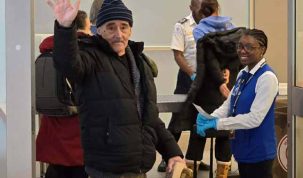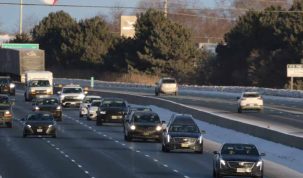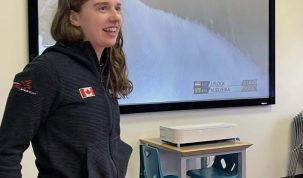Cecilia Nasmith/Today’s Northumberland
For anyone who thought there were five candidates running for the the Northumberland-Peterborough South seat in the 2017 provincial election, Wednesday’s all-candidates night hosted by Sustainable Cobourg brought two surprises.
Surprise number one – there are six candidates, with retired general practitioner Paul Cragg representing the new Stop Climate Change Party.
Surprise nunber two – there were still five candidates present at the event, as Progressive Conservative candidate David Piccini failed to join Cragg, Trillium Party candidate Derek Sharp, NDP candidate Jana Papuckoski, Green Party candidate Jeff Wheeldon and Liberal incumbent Lou Rinaldi on the panel.
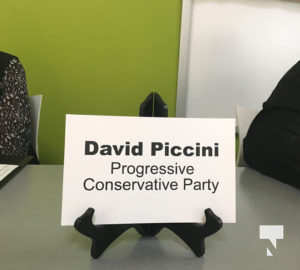
Though Piccini’s name plate remained on display where he would have sat, his chair was quietly lifted away early in the evening. And at meeting’s end, as thank-you gifts of a rosemary plant were distributed to each candidate, Piccini’s went unclaimed.
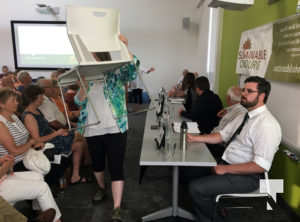
“Unfortunately, the one candidate, about 10 days ago, declined the invitation,” Sustainable Cobourg vice-chair Jane Finn said, adding no further details.
Cragg explained that his party had only been founded in Peterborough within the past month. In this election, he and a retired Peterborough doctor are the only candidates running for the Stop Climate Change Party.
“We are very concerned about the health of the earth and the climate, and concerned that political parties are not giving enough attention to the issue – which should be the number-one issue in people’s minds,” Cragg said.
Sustainability is a large topic, and questions submitted (in advance on-line and from the audience) touched on some specifics like ground-water protection.
“Ontario has the largest fresh-water reservoirs, probably in North America,” Rinaldi said, adding that he was proud of his government’s Water Protection Act as well as its creation of the Green Belt and Places To Grow legislation that protects farmland.
Wheeldon said the Green Party is committed to the elimination of bottled water and ensuring permanent protection of the Green Belt.
Wheeldon also put forth one of the more shocking proposals of the night, as he shared his party’s support of a toll on 400-series highways that would be applied to creating a more widespread and accessible transit system. Making it more expensive to drive, he said, would increase useage of that transit system.
Papuckoski said the NDP would commit to a 50-50 split with municipalities in funding transit and called for an expansion of Go Train service.
“We know Via is not affordable,” she said.
Rinaldi said his government has just doubled payments to municipalities out of the gas tax, which support local transit solutions.
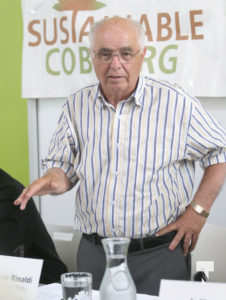
Cragg called for an electric rail system of the kind that runs so successfully in Europe. He also congratulated Wheeldon on being the first politician he’d heard talk about putting a toll on the 400 highways.
More than one question concerned bicycling. A quick show of hands indicated that all candidates enjoy biking though Papuckoski, Sharp and Wheeldon are limited in this pursuit by having young children. Cragg said he tries to cycle regularly, and Rinaldi in recent years has acquired the habit of bicycling 10 km. daily (at least whenever possible).
Only two candidates chose to react to the Federal government’s recent purchase of pipeline and associated infrastructure from Kinder Morgan for $4.5-billion.
“If I don’t get elected, next year I’ll be here talking about it,” Wheeldon said, referring to the 2019 Federal election.
“It’s absolutely atrocious. I feel sick.”
It was a Socialist-Communist move for a Liberal government, Papuckoski added, expressing dismay at what she considered inadequate consultation with the Indigenous communities involved.
More sustainable energy sources is an imperative the candidates spoke to.
Cragg said the big 2003 black-out and the big ice storm a few years earlier in eastern Ontario and Quebec were warnings.
“We got through it, but didn’t change our behaviour,” he noted.
Rinaldi touted the province’s Green On program that helps homeowners retrofit their houses to make them more energy-efficient.
It doesn’t just have to be a matter of more solar panels or windmills, Wheeldon said, A Green government would work with municipal governments on such planning concepts as orienting houses to the south to get more sunlight.
Ways of controlling greenhouse-gas emissions were explored. Wheeldon said the Green Party is calling for the elimination of the internal-combustion engine by 2050, as well as an increase in the $15-per-ton carbon tax (out of which dividends would be paid to taxpayers).
Rinaldi said his government had generated $1.9-billion through cap-and-trade, and legislation provides for that money to go into a special account for green-energy initiatives.
A few questions were presented that didn’t strictly pertain to sustainability, like the one about the future of health care.
Sharp called for the elimination of the Local Health Integration Networks that the Liberals had established.
“This is a government-created administrative body and, like all government-created administrative bodies, over time it devolves into something very ineffectual and eventually becomes a way for governments to create Sunshine Lists out of their friends,” he said.
As a retired doctor, Cragg agreed that most hospital administrations are top-heavy, but did relate one success story – his years of house calls as a palliative-care specialist. Being able to keep patients out of the hospital was better for them, better for the hospitals and more cost-effective overall.
“As long as we continue to put money into acute care and not address why people show up in the ER, our system will not be sustainable – it will be a bottomless pit,” Wheeldon predicted.
It’s a vital issue in a community where so many seniors live, Rinaldi agreed, especially since 2017 marked the point at which seniors over the age of 65 began to outnumber young people aged 15 and under.
“I have been to more 100th-birthday parties in 2017 than I have been to in all my life,” he said.
His government has committed to creating 5,000 long-term care beds by 2020, and 15,000 over the next 10 years.
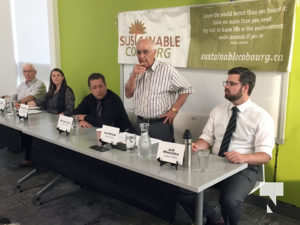
One questioner wondered what would be done to address poverty and homelessness.
Wheeldon described his party’s guaranteed-income policy that (as the name suggests) guarantees everyone a minimum income (as opposed to having to prove one is out of work or disabled to access benefits now available). The party is very concerned about the cost of poverty, he said, which has an impact in such areas as policing, health care and loss of opportunity due to inadequate education.
Three pilot projects of a similar nature are now going on under the Liberals, Rinaldi said, and his government has just done something very basic but very far-reaching – raising the minimum wage to $14 an hour, with a commitment for a further $1 hike to come. He cited a Toronto Star interview with a food-bank manager that gives some credit to this raise for the recent decrease in traffic he is seeing at the food bank.
“I know people who work 50 to 60 hours a week and still can’t seem to get by,” Papuckoski said. She listed some ideas she would like to see pursued, such as affordable housing, free prescriptions and dental care, and reduced hydro rates.
“I first-hand know the feeling of desperation, throwing a box of your belongings in the back of your car, not knowing where you are going to go,” Sharp said.
“I have a relative sleeping on a cot in the back of a shoe store.”
While he likes the idea of a guaranteed annual income, he considers it vital to ensure a common-sense way to administer it.
Asked what candidate’s sustainability policies were most inspirational, three men were mentioned.
Wheeldon recalled how Liberal candidate Stefan Dion ran for office a dozen years back on a platform that called for a carbon tax. Disdain for that policy combined with his unusually heavy French accent doomed the effort.
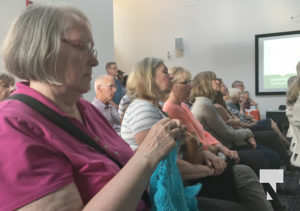
Rinaldi had been campaigning for Liberal candidate Paul Macklin in that election.
“We were virtually pushed away from the door when we mentioned his climate initiative,” he recalled.
“To the good side of that, we have come a long way, even in the last five or six years.”
Papuckoski had been in Toronto when NDP candidate Jack Layton had been campaigning one year, and observed his penchant for biking or walking wherever he had to go.
“He changed how I consider a politician,” she said.
“As a medical doctor, Tommy Douglas, father of medicare,” Cragg declared.
“We need to be very vigilant and make sure our politicians act in our best interest.”
“What do you say to those who say a vote for the Trillium Party or Green Party is wasted?” Wheeldon and Sharp were asked.
“A vote for one of the big three parties that have a track record of putting the boot to us is a wasted vote,” Sharp retorted.
Wheeldon said that the focus is on the provincial leaders more than the local candidates, and prospective voters are caught up in the horse race among the big three.
“If you follow the horse race, you are quite literally gambling with your future,” he said.
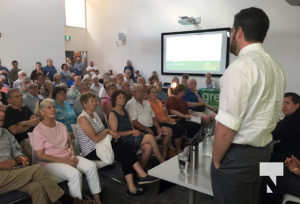
Cragg added two words – electoral reform – and called on Ontario to consider proportional representation This might give a candidate like Wheeldon or Sharp a place at the table, he figures.
Perhaps the most interesting part of the debate came at its start, when each candidate had the chance to share some information about him- or herself and why he or she wanted to enter politics.
Cragg expressed his hope of keeping the climate-change issue in the public eye and reversing the present trends – “temperatures reaching record highs and lows, severe floods and droughts all illustrate the severity and urgency of this trend. The time to act is now. There’s no time to wait,” he said.
“My parting message is, do not vote for me. Vote for the candidate who is the most likely to get elected and make these changes happen.”
Wheelon thanked Cragg for his message, which frees him from having to argue the basic question of whether climate change is real and concentrate on what can be done.
Now a real-estate agent, he had originally trained as a Christian minister.
“The more I turned my gaze to heaven, the more it was redirected back to earth, serving others and taking care of what was given to us,” he said.
Papuckoski said she had worked for years as a bank security guard, “going from bank to bank, contract to contract with no benefits, not knowing where I would be working next.”
Not having a government that supports people like herself was a strong motivator, she said – not just on the employment front, but as a mother with two small children and two aging parents with complex medical issues.
Sharp described his challenges as a father with two children on the autism spectrum and how he wanted to protect what he described as the front-door community of Colborne that he had moved to from Ajax.
Giving back to one’s home community also drove Rinaldi, who has lived in the Brighton area for 38 years and has served in politics (municipal and provincial) for a quarter-century. Now that he has nine grandchildren, he has found the protection of the environment assuming a top priority – especially after his young grandson pointed to billowing clouds coming out of a smokestack and told him he had to do something about it.


